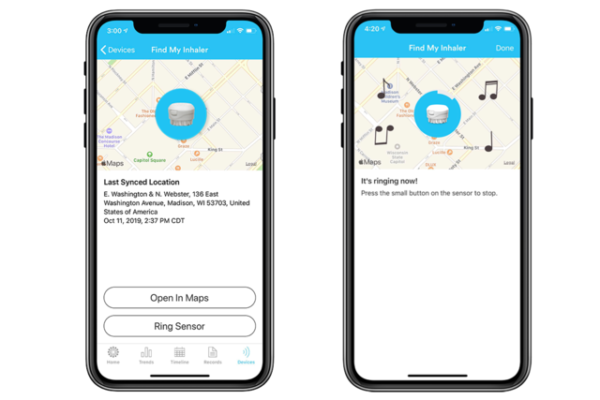
David Van Sickle, CEO of Propeller Health
There are different kinds of entrepreneurs out there, one type being those who sell their baby and move on. They take a break and maybe come back to start another company.
Not David Van Sickle, co-founder and CEO of Propeller Health(Opens in a new window), a digital health company that makes a sensor that can be attached to a rescue inhaler. The sensor and companion app has been shown to help asthma and COPD patients manage their diseases better(Opens in a new window). Propeller Health was founded in 2010.
Van Sickle’s eyes shine as he outlines the array of opportunities that have opened up ever since medical device maker ResMed acquired the Wisconsin startup(Opens in a new window) in January for $225 million.
“I am not done, no way,” he said in an interview at the HLTH(Opens in a new window) conference in Vegas on Tuesday. “I feel like we have this amazing opportunity to put technology that we know is amazingly clinically effective to work at a scale that we never would have likely gotten to on our own.”
He is thrilled about the latest product tweak to the Propeller sensor that can now allow COPD and asthma patients to locate their lost inhalers.

“Yes, we released one of my favorite features of all time,” Van Sickle said, glowing. “Inhalers have these remarkably active social lives. They end up getting lost or misplaced. So we released a feature as part of the Propeller app that lets people essentially locate where their inhaler is.”
It may seem simple, he added but is on the list of most-wanted feature updates requested by patients. Product enhancements like this aside, what really gets Van Sickle excited about the future is both the sheer number of COPD and asthma patients Propeller Health can serve as well as when in their disease journey, the company may step in to assist them.
Currently, the company has more than 100,000 patients using the sensor and app on their inhalers. ResMed is in 120 countries, including places like China and India where Van Sickle hopes to be someday. Right now he is looking to penetrate further in the U.S., Europe and Japan.
But the second goal is more intriguing. Propeller Health wants to help in the diagnosis of the disease and in doing so help patients get treatment earlier.
ResMed and Propeller Health] saw this opportunity together to essentially build a digital solution from much earlier on in disease progression and support a patient over the course of their asthma and COPD and perhaps related diseases too
“How can we support better diagnosis and earlier appropriate treatment?” he posited. “How can we deliver intervention through Propeller and ResMed’s businesses that are complementary to what we are trying to do – whether it be tobacco cessation or pulmonary rehab or what have you.”
Van Sickle declared that other than the banking industry no one has built a ” digital relationship with a patient over a really long horizon other than maybe like banking – where you are using that relationship with a person over the whole arc of a person’s life.”
What will help Propeller Health and, in turn ResMed to achieve both better penetration and broaden their reach over the continuum of care, are macroeconomic trends in the industry, namely value-based care. VBC has made bearers of risk to focus very closely on managing chronic diseases better.
“We were a very bad solution for fee-for-service,” Van Sickle says, chuckling.
While historically working with payers and at-risk providers to deploy Propeller Health’s sensor solution and app, now the company has started working with providers. That’s partly because remote patient monitoring is beginning to be covered by the Centers for Medicare and Medicaid Services and commercial insurers.
“We are starting to onboard a lot of provider practices who are using Propeller to monitor patients and support better self-management and get reimbursement for that,” Van Sickle said.
Photo: Propeller Health
Correction: An earlier version of the story erred in the timing of the ResMed acquisition of Propeller. It was actually acquired in January of this year, not December 2018.






